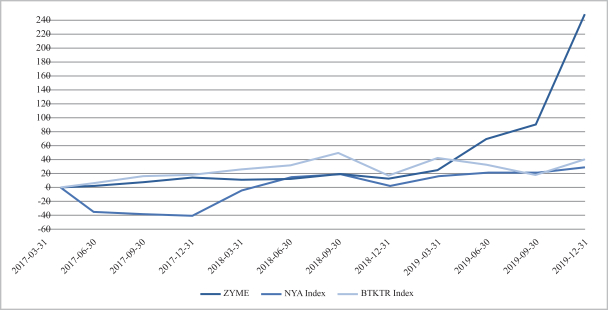disposition, the common shares generally will not constitute taxable Canadian property of a
Non-Resident
Holder, unless at any time during the
60-month
period immediately preceding the disposition the following two conditions are met concurrently: (i) the
Non-Resident
Holder, persons with whom the
Non-Resident
Holder did not deal at arm’s length, partnerships in which the
Non-Resident
Holder or persons with whom the
Non-Resident
Holder did not deal at arm’s length holds a membership interest directly or indirectly through one or more partnerships, or the
Non-Resident
Holder together with all such persons, owned or was considered to own 25% or more of the issued shares of any class or series of shares of the capital stock of the Company; and (ii) more than 50% of the fair market value of the common shares was derived directly or indirectly from one or any combination of real or immovable property situated in Canada, “Canadian resource properties” (as defined in the Tax Act), “timber resource properties” (as defined in the Tax Act) or a options in respect of, or interests in, or civil law rights in, such properties, whether or not it exists.
If the common shares are taxable Canadian property to a
Non-Resident
Holder, any capital gain realized on the disposition or deemed disposition of such shares may not be subject to Canadian federal income tax pursuant to the terms of an applicable income tax treaty or convention between Canada and the country of residence of a
Non-Resident
Holder, including the Convention.
A
Non-Resident
Holder whose shares are taxable Canadian property should consult their own advisors.
Dividends on Common Shares
Under the Tax Act, dividends on shares paid or credited to a
Non-Resident
Holder will be subject to Canadian withholding tax at the rate of 25% of the gross amount of the dividends. This withholding tax may be reduced pursuant to the terms of an applicable income tax treaty or convention between Canada and the country of residence of a
Non-Resident
Holder. Under the Convention, a U.S. Holder will generally be subject to Canadian withholding tax at a rate of 15% of the gross amount of such dividends (or 5% in the case of a U.S. Holder that is a company beneficially owning at least 10% of the Company’s voting shares). In addition, under the Convention, dividends may be exempt from Canadian
non-resident
withholding tax if paid to certain U.S. Holders that are qualifying religious, scientific, literary, educational or charitable
tax-exempt
organizations and qualifying trusts, companies, organizations or arrangements operated exclusively to administer or provide pension, retirement or employee benefits that are exempt from tax in the United States and that have complied with specific administrative procedures.
The CRA allows residents of any country with which Canada has a tax treaty to certify that they reside in that country, so they are eligible to have Canadian
non-resident
tax withheld on the payment of dividends at the reduced tax treaty rate. Individual registered shareholders should complete a Form NR301—“Declaration of Eligibility for Benefits (Reduced Tax) under a Tax Treaty for a
Non-Resident
Person” and return it to our transfer agent, Computershare Investor Services Inc.
Certain U.S. Income Tax Considerations For U.S. Holders
The following discussion is a general summary of certain U.S. federal income tax consequences of the ownership and disposition of the common shares. It applies only to U.S. Holders (as defined below) that acquire and hold the common shares as capital assets (generally, property held for investment purposes) and is of a general nature. This summary should not be construed to constitute legal or tax advice to any particular U.S. Holder.
This summary does not apply to or address U.S. Holders subject to special rules, including, without limitation, brokers, dealers in securities or currencies, traders in securities that elect to use a
mark-to-market
method of accounting for securities holdings,
tax-exempt
organizations, insurance companies, banks, thrifts and other financial institutions, persons liable for alternative minimum tax, persons that hold an interest in an entity that holds the common shares, persons that will own, or will have owned, directly, indirectly or constructively 10% or more (by vote or value) of the Company’s equity, persons that hold the common shares as part of a hedging, integration, conversion or constructive sale transaction or a straddle, or persons whose functional currency is not the U.S. dollar.




